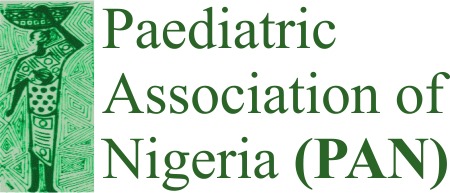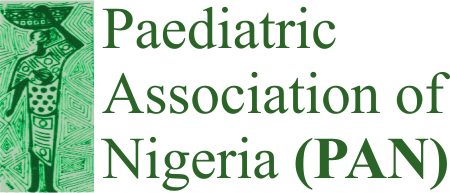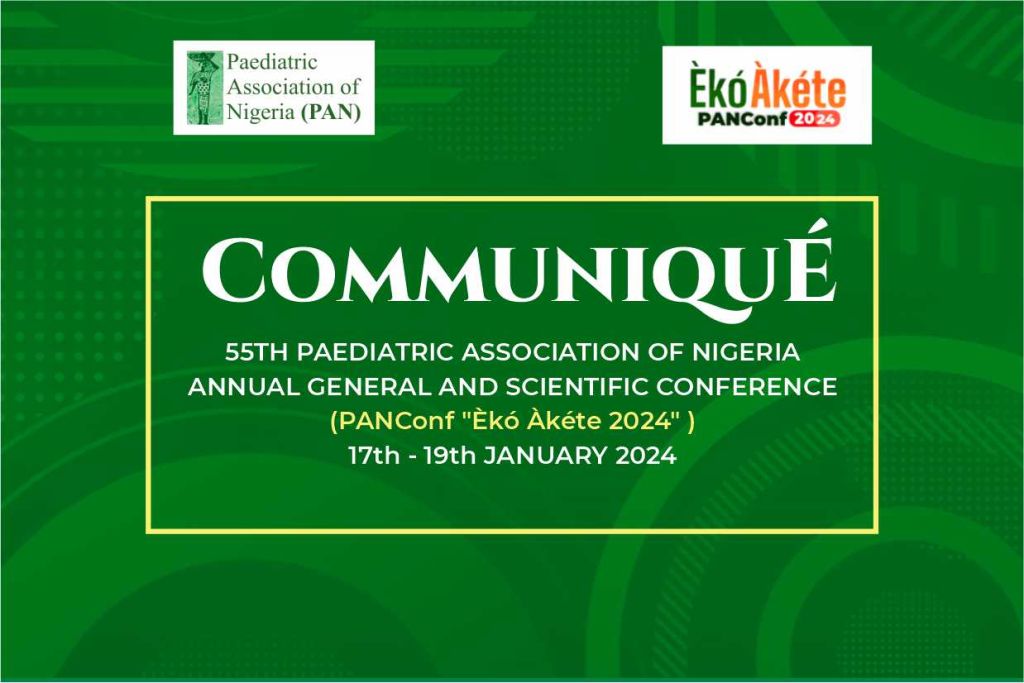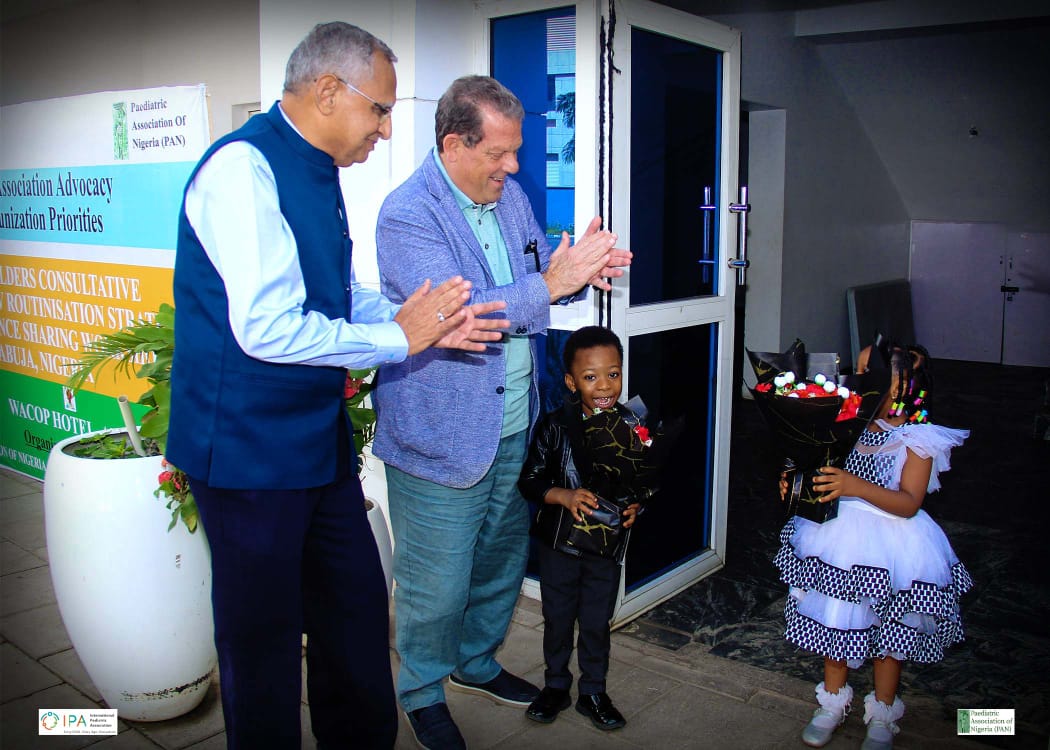55TH PAEDIATRIC ASSOCIATION OF NIGERIA ANNUAL GENERAL AND SCIENTIFIC CONFERENCE (PANConf “Èkó Àkéte 2024” ) 17th – 19th JANUARY 2024
The 55th Annual General Meeting and Scientific Conference of the Paediatric Association of Nigeria (PAN) was tagged PANConf 2024 and themed “Èkó Àkéte 2024”. The main conference held between 17th and 19th of January 2024 at the Oriental Hotel, Victoria Island, Lagos. Eight pre-conference workshops on Helping Babies Breathe (HBB), Neonatal Resuscitation (NRT), Respiratory Support on (MV), Child Neurology, Paediatric Nephrology, Paediatric Emergency Medicine, Paediatric Infectious Diseases, and Paediatric Oncology (NISPO) also held between 15th and 16th of January at various venues in Lagos State. PANConf 2024 featured several innovations including early morning virtual Master Classes and debate sessions on topical child health issues.
The theme of the conference was Beyond Strategies and Goals: Reaching Every Child in Nigeria with Optimal Care. The sub-themes were Tackling Zero-dose in Nigerian Children, Addressing Addiction Pandemic among Adolescent Youths; Safeguarding the Nigerian Child through Health Promotion, Prevention and Supportive Collaboration; and Advancing PAN conferences.
The opening ceremony held on the 17th January 2024 under the Chairmanship of Chief Tunde Afolabi who was represented by Prof Oladapo Afolabi, CFR. The ceremony was declared open by the Special Guest of Honour, the Co-ordinating Minister of Health and Social Welfare, Dr Mohammed Ali Pate represented by the Director, Family Health, Federal Ministry of Health, Dr Stella Nwosu. Also in attendance were Her Excellency, Dr. Ibijoke Sanwo-Olu, the first lady of Lagos State, Her Excellency, Princess Adejke Orelope-Adefulire, the Senior Special Assistant to the President on Sustainable Development Goals, Dr. Ifedayo Adetifa, DG, Nigeria Centre for Disease Control (NCDC), Dr Muyi Aina, ED/CEO, National Primary Health Care Development Agency (NPHCDA), Mr. Martin Dohlsten, representative of United Nations International Children’s Emergency Fund (UNICEF), Dr Joy Ufere-Isikima, representative of World Health Organization (WHO) and Dr. Abimbola Mabogunje, Permanent Secretary, Lagos State Ministry of Health, among others.
A total of 692 international and local participants, and invited speakers attended PANConf 2024. They included, Paediatricians, Residents in Paediatrics, Nurses, Pharmacists, officials of Government Ministries, Departments and Agencies such as Federal Ministry of Health, NCDC, NPHCDA, National Drug law Enforcement Agency (NDLEA), Bank Of Industry (BOI), International Development Partners namely UNICEF, WHO, Clinton Health Access Initiative, civil societies such as Cece Yara Foundation and Child Protection Network, pharmaceutical companies, Pricewaterhouse Coopers, mothers of children living with chronic conditions and other health workers in the child health space. Good will messages were presented by dignitaries from within and outside the country including the President of International Paediatric Association, Dr Naveen Thacker.
The keynote address, also tagged the inaugural Bolaji Ajenifuja Annual Memorial Lecture, titled Bringing Down the Elephant: Key to improving the Health Status of the Nigerian Child was delivered by Dr Olufemi Mobolaji-Lawal, the 2010 Distinguished Paediatrician of the Year Awardee and a past President of the Association and a successful Paediatrician in private practice. The lecture illuminated the situation of the Nigerian Child, highlighting the factors that affect them; the key policies and strategies for child health in Nigeria and their impact achieved so far; and why they have not had the desired effects. He recommended a four-pronged approach, namely tackling the adverse socio-economic factors, strengthening the health systems, achieving universal health coverage and focusing more on communities with roles of government, partners and international agencies, and PAN clearly spelt out.
Also held was the Inaugural Professor Theodore Chukwunyere Okeahialam NJP Hour titled “Strategic Leadership through Evidence-based Advocacy in Child Health Policies and Interventions – Role of the Nigerian Journal of Paediatrics”. This was delivered by another past President of the PAN, the 2019 Distinguished Paediatrician of the Year Awardee and past President of UNAPSA – Dr Dorothy Esangbedo. She emphasised the link between child survival and effectiveness of governance, dwelt on health systems and their challenges and National child Health Policy of 2018. She also highlighted the need for more involvement of PAN in child mental health research and advocacy, and psycho-social support for children.
The conference also featured 10 plenary symposium sessions featuring topics such as reaching every Nigerian child with optimal care, Information technology and finance as enablers of optimal care, the zero-dose Nigerian children, and lessons learnt from the COVID-19 pandemic and the ongoing diphtheria epidemic. Other topics exhaustively discussed were addiction among the adolescents, safeguarding children at home, school and online and the business of medicine. Over 200 papers were accepted as abstracts including 60 as oral presentations during 11 parallel scientific sessions.
During the Annual General Meeting, a new executive council led by Dr Ekanem Nsikak Ekure, a Professor of Paediatrics and Consultant Paediatric Cardiologist was elected into office. In addition, an eminent Paediatrician, Professor Obot Antia-Obong, was honoured with the 36th Dr. and Mrs. Bolaji Ajenifuja Distinguished Paediatrician Award for the year 2024.
The conference observed the following:
- Nigeria is one of the 54 countries that are off tract towards achieving the Sustainable Development Goals (SDGs) by 2030.
- More than 850,000 Nigerian children die annually, accounting for 15.5% of global child deaths. Many of the deaths are related, directly or indirectly, to diseases like pneumonia, diarrhoea, malaria and malnutrition, all of which can be treated at the primary health care level.
- Nigeria needs to speed up the rate of reduction of under-five mortality from the current 1.8% to the much desired 16.5% with simple child survival action plans such as optimal breast feeding, immunisation, treatment of pneumonia, diarrhoea and malaria control amongst others, in order to achieve SDG by 2030.
- Nigeria has an unacceptably low national immunization coverage and is home to approximately 2.3 million zero-dose children, accounting for 11% of the global burden of zero-dose children; this is the root cause of the ongoing diphtheria outbreaks in Nigeria.
- Many Nigerian children spend considerable time on screens and online without significant parental supervision.
- Child sexual abuse is common; about 90% occur online, 43% at home and 90% of these incidents are unreported.
- PAN is inadequately involved in the mental health care and psycho-social support needs of Nigerian children.
- The national screening programme for common childhood illnesses, including neurodevelopmental disorders, is weak or non-existent.
- The needed health manpower proportionate to our burden of disease is eight times our current health manpower at all levels. The migration of skilled and experienced health personnel is one major crisis afflicting the already thin health workforce.
- Adolescence is the peak age of initiation into alcohol and substance use and the prevalence of illicit drug use and other addictions in Nigeria are embarrassingly high. As tools for reducing the menace of substance abuse, social resistance skills trainings are more effective than fear- arousing lectures or techniques.
- A number of advocacy tools with great potentials have not been optimally utilised for the improvement of health of the Nigerian Child.
- Collaboration between paediatricians, other professional groups and funding institutions such as the Bank of Industry (BOI) is underutilised.
The conference recommended as follows:
- The Government should tackle inflation, insecurity, poor infrastructure, worsening poverty and food security as measures to achieve the Sustainable Development Goals (SDGs) by 2030.
- To achieve Universal Health Coverage, the health system especially the primary health care centers should be strengthened and made accessible by employing and retaining adequate health workforce.
- Timely and life-saving interventions for newborns and non-formal training of Traditional Birth Attendants (TBAs) should be strengthened in order to reduce childhood mortalities.
- The Government should prioritise sustainable local production and distribution of vaccines with realistic timelines.
- Parents should ensure no screen time for a child in the first two years of life and desist from leaving children and adolescents unsupervised on internet enabled devices. They should also learn the meaning of social media abbreviations commonly used by children and adolescents. This will curb the negative effect of social media on them.
- The Government should scale up the arrest and prosecution of sexual offenders to discourage the act of child sexual abuse.
- There is a need to scale up mental health screening of adolescents and provide psychosocial support and rehabilitation for affected children.
- The Government should develop and ensure the implementation of national policies on screening programmes for common disorders such as sickle cell disease, visual and hearing impairments, and neurodevelopmental disorders.
- The health care workers especially paediatricians should be encouraged by providing a conducive working environment with multifaceted incentives to discourage emigration. There should be regular self-development of medical personnel through on-the-job trainings to improve individual capacity to offer quality health care for Nigerian children.
- With the collaboration of PAN, Government should scale-up competence-enhancement programmes and social resistance skills trainings to reduce the burden of substance abuse among adolescents.
- PAN should also deploy all the necessary advocacy tools for strong advocacy towards the enhancement of evidence-based improvement in child health.
- Partnership and collaboration between PAN, funding institutions and other professional groups, NGOs, CSOs, IT specialists, the mass media and social influencers should be encouraged to achieve an improved health status of the Nigerian child.
The PAN commends the PANConf “Èkó Àkéte 2024” Local Organizing Committee for a well-organised Conference, the Government and good people of Lagos State for their warm hospitality and all our partners for their unflinching support towards the success of the Conference.
Dr. Ekanem Ekure Dr. Chika Duru
PAN President PAN Secretary





